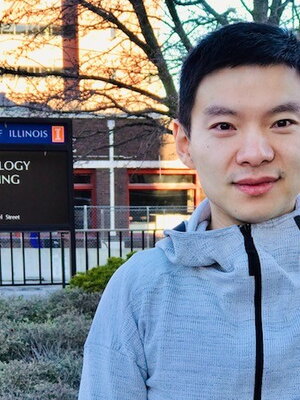
We invited Yadong Dai to join our MSPS program because of his notable achievements and interest in memory research. Originally, Yadong studied civil engineering at the Sichuan University. His interests shifted from engineering to psychology after he directly observed the differential impact of stressful events on people’s well-being in the aftermath of the Wenchuan Earthquake in China—a devastating event in 2008 that affected 90,000 people. Because of his expertise, he volunteered as a civil engineering consultant to provide building stability analyses to the earthquake-stricken areas. Many other people volunteered their help as well—including English-speaking care providers who could not speak Mandarin. When volunteer therapists learned that Yadong could speak both languages, they asked him to serve as a translator. In this role, Yadong spoke the therapist’s words and connected with the practicality and compassion he observed in their work. While translating the experiences of the victims for the therapists, he marveled at the way people remembered the earthquake and its aftermath; people seemed to vary in how they stored and retrieved details of the event. As an engineer, he wanted to know the structure and mechanisms of memory the way he understood the structure of buildings. He questioned how a memory is perceived, encoded, and retrieved. The translation experience inspired Yadong to study psychology when he returned to the Sichuan University. He then pursued a master’s degree in psychoanalytic counseling, where he collaborated on research involving neurosis case studies and mental disorders related to memory loss. With a master’s degree, Yadong established a career as a psychotherapist. His clinical work was rewarding, but he still yearned to understand the mechanisms of memory. He heeded a second call to prepare for a career as a psychological scientist to conduct memory research.
Yadong joined the MSPS program to acquire the tools for research and prepare for doctoral study. Here, he collaborates with Drs. Monica Fabiani and Gabriele Gratton in the Cognitive Neuroimaging Lab, studying cognitive aging and functional and structural brain connectivity. In his role, he has learned neuropsychological imaging methods, such as optical spectroscopy (NIRS), functional MRI (fMRI), and event-related potentials (ERPs). Additionally, his interests have expanded to include a neurobehavioral approach to understanding memory. He says, “As time goes by, I realize that human imaging work cannot fully answer my question of how neurons generate signals and meaning. I understand the value of using an animal model.” To explore this facet, Yadong is contributing to the lab of Dr. James Hinman—a new faculty member in Behavioral Neuroscience—whose research broadly explores large-scale electrophysiological recordings in freely behaving animals.
Yadong’s primary interest lies in understanding the neurobiological mechanisms underlying long-term memory formation, storage and retrieval, as well as the electrophysiological representations of neurons during long-term memory processes. As a civil engineering student, Yadong would likely not have envisioned himself as a neuroscientist, but his drive to discover the way the mind—specifically memory—works has steered his course toward a career in research. Importantly, his years working with people affected by trauma add special significance to the work he aims to do.